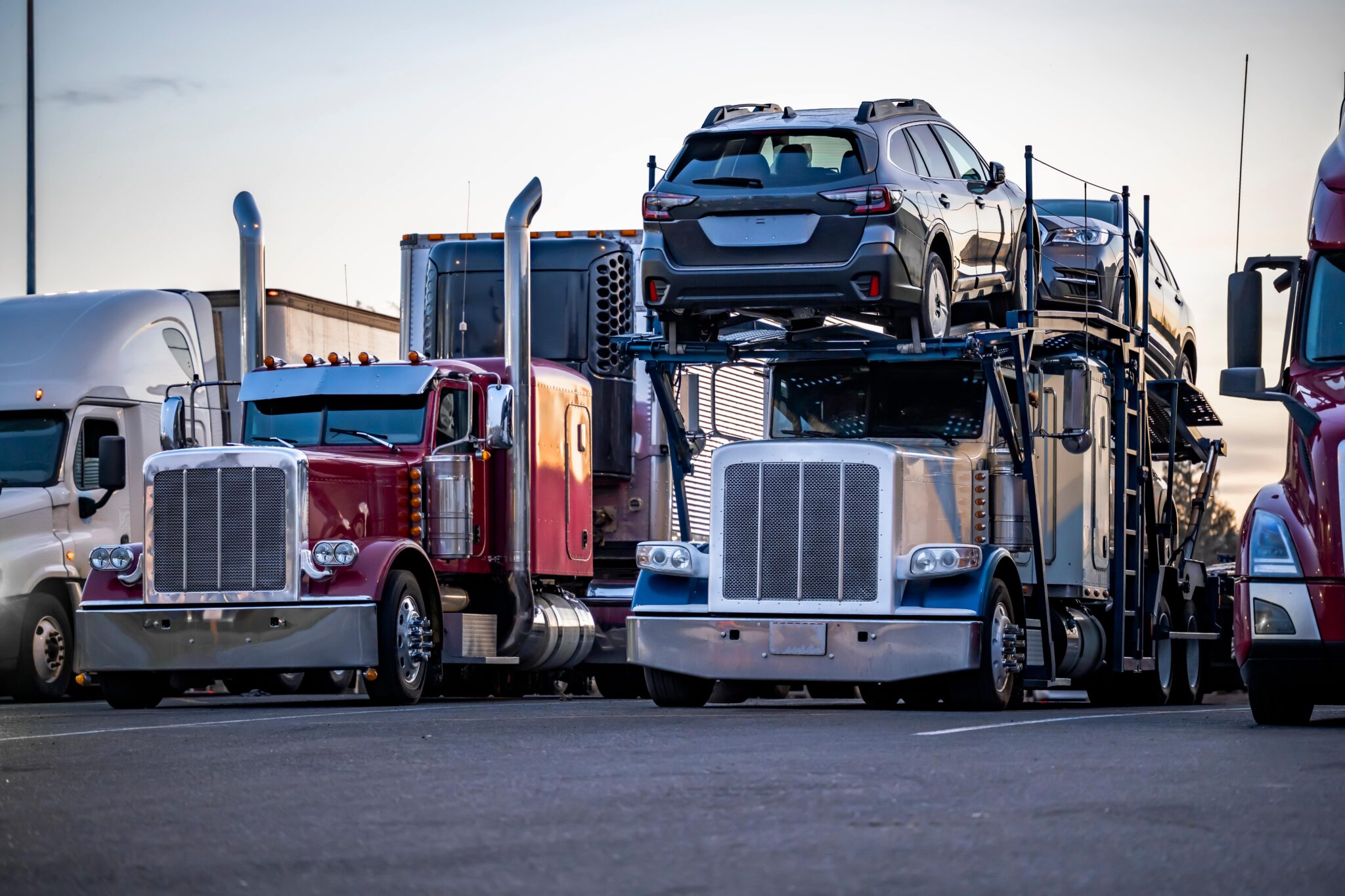How Does Car Shipping Cost Calculator Work? Is it Accurate?
Car transportation has never been easy; many operations and factors are included in the shipping process, making it remarkably complicated. Therefore, it is pretty confusing to calculate the cost without understanding what variables will affect the shipping pricing.
Fortunately, car owners won’t have hard times identifying each variable and estimating the cost themselves. car shipping cost calculator is a great solution that can help both companies and clients save their time and effort, allowing people to find out how much they will pay for shipping service to decide whether they can afford to book the service or not.
What is a Car Shipping Cost Calculator?
It is a tool that generates shipping quotes instantly. Leading auto transport companies offer this tool for free on their websites so customers can get quotes for their vehicle’s transporting process.
All auto transporters request the same information to estimate the shipping cost. However, the estimator collects present data and predetermined values to estimate how much the transporting cost will be. Therefore, it is recommended to use this tool for introductory pricing rather than a binding offer.
How Does the Car Shipping Cost Calculator Work?
Auto transport companies build car shipping cost calculators especially for their customers to use through the company website. The calculator can provide a free quote depending on specific information the customers enter about their vehicles, what type of vehicle shipping services they are looking for, and the shipping time and distance.
The cost calculators differ from one company to another. However, all of them may ask the customers to enter the following information:
- The general customer information, including name, email address, and phone number
- The vehicle pickup and delivery locations.
- Required transport type (open auto transport, enclosed auto transport)
- The vehicle information such as its type, model, year of manufacture, and operational situation.
- The predicted pickup and drop-off dates.
Car shipping cost calculator uses all details provided by the clients and presents data to generate an initial bid; and usually the company will set the price within one hour or day maximum.
The Main Factors that Affect the Shipping Cost
There are some crucial factors to evaluate when someone decides to transport their car; those are variables that will affect the final price:
The shipping method
Auto transport companies offer two shipping methods; open auto transport is an economical type of vehicle moving service; it is operated using open trailers, so the ship. Enclosed auto transport, which provides total protection, is more expensive than open trailers.
Read about When to Choose an Enclosed Auto Transport.
The vehicle type and model
The shipping price varies depending on the car model; large vehicles cost more than small ones because they weigh more and need more space to fit on the trailer; moreover, if the carrier adjusted the car by adding some large tires, it will increase the final transporting cost.
The car’s current condition
Vehicle operating conditions is essential in calculating the auto shipping price; operable cars mean a better quote. However, if the vehicle is inoperable, the auto transport company will use specific equipment to apply the loading and unloading operations which means the car owner must pay more for this extra service.
Fluids leak and mechanical problems require more attention and special treatment during shipping. Therefore, it is necessary to inform the transport company about any current issue they need to be wary of.
Pickup and drop-off date and location
Pickup and drop-off locations play a significant role in the price estimation process; first, the carrier will determine the distance an auto transport trailer travels, the arrival time, and the fuel cost. Furthermore, driving in rural areas means going far from main routes resulting in more fuel and time consumption.
The predicted delivery time also affects the cost; the shorter the duration, the more it will add to the bill. Add to this, bad weather and holiday seasons significantly impact the shipping quote.
Other complimentary services
Auto transport companies offer many services, and the leading shipping service, such as tracking and delivery options, adds extra cost to the equation.
Is the Car Shipping Cost Calculator accurate?
It is essential to know that a cost calculator is a convenient tool to save time; it can provide an approximate price depending on the car owners’ existing values, data, and information.
Although it requires comprehensive information about the vehicle statute, shipping distance, and date, the calculated quote shouldn’t be accepted as a final price. Many unpredictable events may accrue during the shipping process, making it extremely difficult to determine the exact cost. However, the quote offered by the car shipping cost calculator is not entirely accurate, but it is pretty reliable.
When anyone looks for an auto transport service provider, they consider the cost first; they will decide whether to book the service or search a bit more for other available choices.
This reason prompted companies to think of an easy method to help their customers. Car shipping cost calculator is a great tool offered by shipping companies that generate reliable free quotes within a few hours.
If you are looking for a reasonable and affordable vehicle transport quote, visit Tempus Logix and use the cost estimator on the website.
Everything You Need to Know About Moving a Bulldozer
Heavy equipment shipping stands out from other transportation activities; it requires a professional shipping team and skilled drivers specialized in transporting heavy-duty vehicles.
Bulldozers are often found on construction sites; They have a big, flat blade that can vary from one dozer to another depending on the reason it was made for, these blades are attached to the dozer’s front, and the blade can be moved using hydraulic arms. Sometimes it becomes necessary to transport such equipment from one site to another or even across the states. Moving a bulldozer is not easy; there are many things to worry about in the shipping process.
There are plenty of vehicle transport companies in the United States, but not all are qualified enough to ship a dozer or a heavy-duty vehicle. This puzzle is one of the challenges bulldozer owners may face while trying to move their vehicles from one place to another.
Choosing a reliable auto transport company is essential to ensure the dozer is in good hands and the company can handle all the details of the transportation process.
What is a Qualified Auto Transport Company?
- It should be registered and fully licensed in order to get all required permits and operate legally across the states
- Must have skilled drivers, professional teams, and all necessary equipment to move a heavy-duty vehicle
- It should offer insurance coverage for damages that might happen during the transportation. Providing the insurance policy and all the details is also a must
What is the Best Way to Move a Bulldozer?
Auto transport companies offer two main shipping methods, enclosed auto transport which is suitable for rare and expensive cars since it provides complete protection. And open auto transport, which is the best to ship heavy-duty vehicles like bulldozers since dozers are large and heavy, so they can’t fit in enclosed trailers.
However, an extremely large dozer needs an oversized permit to be shipped from one place to another; it also can exceed the height limits, so it can’t pass under bridges. Therefore, it is essential to provide the shipping company with the exact details about the dozer’s weight and height to allow them to plan the best transportation routes.
Moving Bulldozer Attachments
Some dozers can be shipped along with their attachment on the same trailer; when loading it on the trailer, the dozer’s blades must be facing backward to prevent any possible damage.
Meanwhile, a few blade types can’t be transported alongside the bulldozer, such as U-blade and ripper; these blades should be detached from the dozer and shipped separately to facilitate transportation.
Trucks Used in Shipping a Bulldozer
Ask the transport provider about the best truck and trailer combination to ship the dozer, considering the convenient service while keeping the cost as proper as possible.
Small bulldozers can fit on a drop-deck trailer designed to carry tall loads that exceed the height limit. On the other hand, giant bulldozers with more than 30,000 pounds can be moved using a Gooseneck trailer with a higher capacity rating than traditional trailers and can carry more than 40.000 pounds of loads.
The Costs of Moving a Bulldozer
The shipping cost can vary from one company to another, and it is not the same for all transport orders; the price is subject to many factors, including:
- The bulldozer size, height, and weight: the heavier the shipped dozer is, the more it will cost in transportation. Moreover, extra-large cargo requires an oversize transportation permit to move legally across the states.
- As for the height, it is necessary to remove the cab so the dozer will maintain a reasonable height that is safer for everyone; if the length is more than 53 feet, then a loading permit is required to operate rightfully.
- The farther the dropping-off destination is, the more shipping will cost, especially for large dozers that must be transported using a Gooseneck trailer; drivers can’t drive this trailer on all roads. Therefore, they should travel through certain routes where the trailer can move safely, increasing travel distance and cost accordingly.
Preparation Before Shipping a Bulldozer
If you want to ensure a safe trip for the dozer, there are a few things to check before sending it to the next site:
- After the dozer is loaded on the trailer, you should disconnect the battery to prevent the charge from being drained. The doors should be locked and appropriately tied, so they won’t open while in transit.
- It is essential to cover the dozer since it will be loaded on an open trailer and exposed to external elements and dirt.
- You must remove all personal stuff and document the dozer’s condition before shipping to guarantee the company will be responsible for any damage that may occur during transportation.
Conclusion
Shipping a bulldozer is rather challenging. However, dozer owners don’t have to worry much since hiring a professional auto transport company can save their day and guarantee a safe journey to their bulldozer.
Tempus Logix has years of experience shipping heavy-duty vehicles across the states. All required trailers and equipment are available along with professional drivers and team members to organize the whole transportation process from pickup to drop off.
Can Someone Else Pick Up My Car in My Name?
It is hardly a minor task to move a vehicle within the city boundaries, much alone across the country, without the assistance of a professional. If you’re looking for someone to manage your car shipping from one location to another, here’s where carriers and car brokers can come into practice. Auto transport is the easiest and the most convenient way to get your car delivered to your desired destination, regardless of whether you are picking it up in person or authorizing someone else to do it for you. It’s a highly flexible service, and Tempus Logix will arrange the delivery to you or the person you’ve designated as the receiver of your possession. Following your decision to employ auto shipping, here are a few things to know once it arrives at its destination.
The Process of Picking Up a Vehicle at Its Final Destination
When shipping a car, an auto transport company provides you a schedule of delivery dates. Nevertheless, it’s essential to know that a delivery schedule is just an estimate based upon many factors, such as traffic and weather, that may impact the auto shipping duration. Plus, the carrier is likely shipping multiple cars, so that the delivery schedule may vary slightly.
Auto shipping companies might deliver your car to a terminal or their facilities, where you will be requested to come and pick it up. However, you may opt for door-to-door service and get your car delivered directly to your home. Please be informed that if your provided address isn’t safely accessible, a carrier may arrange a new pick-up location nearby.
Who Can Pick Up My Car at the Drop-Off Location?
There can be several reasons why you cannot pick up your car at the final destination. For instance, you may be unable to leave your place of work, be out of town, or perhaps not reside in the city where your vehicle should arrive. Anyhow, you can assign someone else to pick up your car, but you can arrange it only ahead of time. If you consider another guy to pick up your vehicle at the last minute, likely, a carrier won’t release your car. Be aware that if you assign someone else (other than the legal owner) to pick up your vehicle, he must have a notarized letter (plus any proof of identity) authorizing to take your car in your name. In addition, the letter should include information referring to a booking number, the full name of the assignee, and information about the car, including vehicle identification number (VIN).
What Happens if I Cannot Pick Up My Car?
If you have a change of plans in the nick of time and cannot arrange to pick up your car, an auto carrier may offer an option of storing your vehicle for additional fees. Storage fees are placed not by the shipper or auto transport broker but by a terminal company. Therefore, you would be able to retrieve your vehicle from a terminal unit only after paying the storage fee. It’s also essential to inspect your car or ask someone who you trust. It’s the only way to get compensation if your vehicle gets damaged during auto transport. Car inspection reports are initially paper-based, but today you can install a car inspection app on your device to perform a comprehensive vehicle inspection.
The Risks of Cheap Car Shipping
In today’s world of online transactions and quick deals, it’s tempting to opt for the cheapest option when it comes to shipping your car. However, while saving money is always a priority, there are significant risks associated with choosing a cheap car shipping service. From unreliable carriers to hidden fees, here’s what you need to know before you decide to cut costs on shipping your vehicle.
Unreliable Carriers
Cheap car shipping services often rely on carriers with questionable track records. These carriers may not have the necessary licenses, insurance, or experience to transport vehicles safely and securely. As a result, your car could be at risk of damage, theft, or delays during transit.
Lack of Insurance Coverage
Many budget car shipping companies offer minimal insurance coverage or require you to purchase additional insurance at an added cost. In the event of an accident or damage to your vehicle during transit, inadequate insurance coverage could leave you responsible for costly repairs or replacements.
Hidden Fees and Extra Charges
Some cheap car shipping companies lure customers in with low initial quotes, only to tack on hidden fees and extra charges later in the process. These fees could include fuel surcharges, taxes, storage fees, or fees for oversized vehicles. Before committing to a cheap shipping service, be sure to read the fine print and ask about any additional charges that may apply.
Poor Customer Service
Cheap car shipping companies may prioritize cutting costs over providing quality customer service. This could mean limited communication, delays in responding to inquiries, and a lack of support throughout the shipping process. In the event of an issue with your shipment, dealing with unresponsive or unhelpful customer service representatives can be frustrating and stressful.
Long Transit Times
In an effort to keep costs down, budget car shipping services may use slower shipping methods or wait until they have a full load of vehicles before scheduling a shipment. This could result in longer transit times and delays in getting your car to its destination. If you need your vehicle delivered by a specific date, choosing a cheap shipping service could lead to disappointment and inconvenience.
Potential for Damage
Finally, perhaps the most significant risk of opting for a cheap car shipping service is the potential for damage to your vehicle. Cheap carriers may cut corners when it comes to loading, securing, and transporting vehicles, increasing the likelihood of scratches, dents, or other damage during transit.
By following these tips and conducting thorough research, you can find an auto transport company you can trust to safely and efficiently transport your vehicle to its destination. Don’t rush the decision-making process; instead, take the time to evaluate your options and choose a company that meets your specific needs and requirements. With the right auto transport partner by your side, you can enjoy a hassle-free and worry-free transportation experience.
Tips for Finding an Auto Transport Company You Can Trust
In today’s world, relocating a vehicle from a distant location often necessitates the assistance of an auto transport company. However, entrusting your vehicle to just any transport service can be daunting. With so many options available, finding a reliable auto transport company is crucial to ensuring a smooth and stress-free experience. Here are some essential tips to help you find an auto transport company you can trust:
Finding a trustworthy auto transport company requires thorough research and consideration. Additionally, it’s essential to weigh various factors before making a decision.
Here are some steps you can take:
Check Reviews
Look for reviews and testimonials from previous customers. Websites like Yelp, Google Reviews, and the Better Business Bureau (BBB) can provide insights into the reputation of the company.
Verify Licensing and Insurance
Ensure that the auto transport company is properly licensed and insured. You can check their licensing with the Department of Transportation (DOT) and verify their insurance coverage.
Request Quotes
Obtain quotes from multiple auto transport companies. Be wary of companies that provide significantly lower quotes than others, as this could be a red flag for potential issues.
Ask Questions
Contact the companies you’re considering and ask questions about their services, insurance coverage, delivery times, and any other concerns you may have. A reputable company will be transparent and responsive to your inquiries.
Website Quality
A good website should provide comprehensive information about the company’s services, pricing, coverage area, insurance policies, and customer reviews. This transparency can help you make an informed decision.
Tempus Logix is a nationwide shipping company with excellent reviews and customized shipping quotes. The company’s professional team can arrange a safe and seamless shipping process for any vehicle type.
How Does the Auto Shipping Industry Impact the U.S. Economy?
The auto shipping industry continues to offer great benefits, from relieving people from the stresses of moving their vehicles to supporting the country’s economy. In this article, we will go back in time to recall the beginnings of the auto shipping industry and see how it developed and grew over time and how the auto shipping industry, in its current state, impacts the U.S. economy.
How did the auto shipping industry start?
The emergence of the auto shipping industry can be traced back to the 20th century when automobiles began to gain popularity. Before the advent of auto shipping, cars were transported using trains, a slow and expensive method. The demand for a more flexible and efficient auto shipping method led to the invention of the first car carrier by Alexander Winton in 1899.
Winton’s invention consisted of a special trailer that could carry up to five cars at once, significantly improving the previous method of shipping cars individually. The car carrier was an instant success, and Winton’s company soon became one of the leading auto shipping companies of the time.
As the automobile industry grew, so did the auto shipping industry. The increased demand for cars led to the need for more efficient and cost-effective transportation methods. It led to the development of specialized auto carriers, which could transport multiple cars at once, and the creation of auto shipping companies dedicated solely to the transportation of cars.
The development of the auto transport industry
With the rise of automobile usage in the U.S., car manufacturing rapidly increased, leading to a surge of vehicles on the roads. This created a demand for auto transport services to efficiently move these cars across the country. As a result, auto transport companies emerged to fill this need.
Today, the auto transport industry has grown into a massive market with thousands of companies and employees. Based on a recent survey, the number of auto transport companies in the U.S. has reached 4848, generating an estimated revenue of $11 billion. The industry has also employed around 48,422 individuals, demonstrating its significant impact on the labor market.
The auto transport industry continues to thrive and is expected to grow by 1.3% in 2023, with a market size estimated at $10.9 billion in revenue. Furthermore, the demand for auto-hauling services is expected to remain steady until 2024, indicating a consistent need for the services provided by the industry.
Given the industry’s success, it is no surprise that the market is highly competitive, with many companies vying for a share of the revenue. As such, companies in the auto transport industry must continue to innovate and improve their services to maintain their competitive edge and meet the needs of their customers.
The impact of the auto transport industry on the U.S. economy
Supporting the auto industry’s growth
In the previous section, we have clarified that the auto transport prosperity is linked with the auto industry’s success. The auto industry is a vital component of the U.S. economy, with a projected market size of $104.1 billion in 2023 and a growth rate of 3.3%. Its contribution to the country’s economic growth cannot be overstated.
The auto transport industry heavily impacts the auto industry and, by extension, the economy. Without reliable auto transport services, the auto industry would face significant challenges in maintaining its supply chain. Efficient and dependable transport services are necessary to move vehicles from production facilities to dealerships and customers.
Contributing to the GDP
The auto shipping industry contributes significantly to the U.S. gross domestic product (GDP) by facilitating the movement of goods across the country.
Creating opportunities
In addition to the significant market size and growth of auto transport, the industry also supports the economy by creating job opportunities and employing thousands of workers, including truck drivers, administrative staff, brokers, and other roles.
Providing better accessibility
The auto shipping industry enables people nationwide to access a wider range of vehicles, regardless of where they live. It improves transportation access, which supports economic activity by enabling people to commute to work, travel for business, and access goods and services.
Auto hauling operators’ profits
Car-hauling carriers are typically paid per car for long-distance hauls, with average rates ranging from $300 to $800 for hauls over 200 miles. However, the rates can be significantly higher for transporting luxury or exotic cars, with some carriers charging between $1,000 and $2,000 per car for specialized services.
The cost of hauling luxury or exotic cars is also influenced by the need for specialized equipment, such as enclosed trailers, to protect high-value vehicles during transportation. These trailers can cost significantly more than standard trailers, adding to the costs of specialized services. Additionally, the cost increases if the hauled cars are of higher value, like luxury or exotic cars, as they need special hauling equipment, which adds additional costs.
Since we’re talking about auto shipping costs, it’s worth mentioning that many auto shipping service providers implement online auto shipping cost calculators on their websites. Tempus Logix has invested heavily in developing a cutting-edge AI-based auto transport cost calculator that can provide accurate and instant quotes. Website visitors can easily get instant auto shipping quotes sent to their emails in seconds after filling out a specific form about the shipment details.
Finally, auto transport is a profitable business, and its great market size and promising future undoubtedly contribute to strengthening the economy and creating more opportunities. Indeed, the industry is essential for economic growth and stability.
Top Car Collections in the World
Car collections encompass a wide variety of vehicles, including vintage classics, rare and exotic models, muscle cars, luxury vehicles, sports cars, concept cars, and more. While some collectors focus on specific makes or models, others strive for diversity across different eras and categories.
Maintaining a car collection involves more than just acquiring vehicles; it also entails preserving, restoring, and displaying them.
Some collectors open their collections to the public on certain occasions or by appointment, allowing others to appreciate and learn from their passion for automobiles. Additionally, car collectors may participate in automotive events, rallies, and exhibitions to share their enthusiasm with like-minded enthusiasts and to showcase their prized possessions.
The world’s top car collectors
Defining the “best” car collections in the world is subjective, as it depends on individual taste and criteria. However, some collections stand out for their size, rarity, historical significance, or unique themes. Here are some of the best collections in the world:
Sultan Hassanal Bolkiah
The largest private car collection globally boasts over 7,000 vehicles. It includes Bugattis, Ferraris, Rolls-Royces, and even custom-made models. Many of the cars haven’t been seen in decades, underscoring the collection’s unparalleled scale and exclusivity.
Ralph Lauren
Fashion mogul Ralph Lauren is renowned not only for his “Polo” designs but also for his striking all-red car collection.
His passion for automobiles drove him to acquire over 70 rare and remarkable cars, each boasting its own story and significance. From classic Bugattis to sleek Ferraris, Lauren’s collection stands as one of the greatest in the world.
The cars are displayed on an all-white platform in his specially designed NYC garage, carpeted in all-black fashion.
Jay Kay
Jay Kay, the lead singer of Jamiroquai, is renowned not only for his captivating melodies but also for his impressive car collection.
His collection of at least 68 cars encompasses a wide range of marques, including Porsches, Ferraris, Rolls Royces, Lamborghinis, Mercedes, Bugattis, Maseratis, and even Coco Chanel’s Mercedes 600.
Dmitry Lomakov
Dmitry Lomakov, a businessman and car collector, has gained renown for amassing an impressive collection of antique automobiles.
His museum houses over 120 antique cars and motorcycles, among which is the rare 1914 Peugeot motorcycle.
Jay Leno
Jay Leno, the renowned comedian, television host, and car enthusiast, has an impressive collection.
His collection include approximately 181 vehicles, comprising 90 classic cars, 45 motorcycles, 45 modern cars, and 1 tank.
Miles Collier
Miles Collier is a renowned car collector whose collection is widely considered one of the finest in the world. Housed at the Revs Institute in Naples, Florida, the Miles Collier Collections encompass over 100 vehicles, ranging from early automobiles to modern supercars. The collection is particularly strong in sports and racing cars, with examples from Ferrari, Porsche, Mercedes-Benz, and many other marques.
The Miles Collier Collections are a must-see for any car enthusiast. It is a unique and comprehensive collection that tells the story of the automobile from its earliest days to the present.
Ion Tiriac
Ion Tiriac, a Romanian businessman and former tennis player, is known for his passion for collecting, particularly cars and motorcycles. His collection, aptly named the Tiriac Collection, is considered one of the most impressive private collections in the world.
The Collection boasts over 350 vehicles, ranging from historical models dating back to 1899 to modern-day exotics. Only about 165 of these are on display at any given time, with the rest being rotated regularly.
The Tiriac Collection is located in Bucharest, Romania, and is open to the public.
Arturo Keller
Arturo Keller is a well-known figure in the world of car collecting. He has gained recognition for his extensive and prestigious collection of automobiles, which includes rare and vintage cars from various eras and manufacturers.
Keller’s passion for cars extends far beyond simply owning them; he frequently engages in restoring and preserving historic vehicles, ensuring they maintain pristine condition for future generations to appreciate.
Keller’s car collection serves as a testament to his love for automobiles and his commitment to preserving automotive heritage.
Evert Louwman
Evert Louwman, the founder of the Louwman Collection, has curated an extraordinary assembly of classic European and international automobiles. This remarkable collection, which dates back to 1934, boasts over 275 cars from 18 countries and more than 100 manufacturers. It is one of the oldest private collections of historic vehicles globally and is now open to the public.
Jerry Seinfeld
Jerry Seinfeld, the renowned comedian, actor, and television host, boasts an impressive car collection that includes a fleet of highly sought-after Porsches.
His car collection includes over 150 vehicles.
For more insights into Jerry Seinfeld’s car collection, you can explore his private garage, which houses rare and iconic cars like the first production Porsche 911, the legendary 917K, and the ultra-lightweight 908/03 Spyder.
Tempus Logix services
Tempus Logix stands as a dependable leader in the auto transport industry. Specializing in the transportation of a diverse range of vehicles, from prized collectibles to robust heavy-duty machinery, the company ensures reliable and efficient shipping services nationwide.
Learn more at TempusLogix.com, get an quote or call us at (818) 942-7030
What is Coast to Coast Auto Transport?
At some point, you may need to ship your car coast-to-coast. If you are moving houses and you don’t want to drive all that distance, the best thing to do is for you to ship your car through a car shipping company, and maybe even ship all of your belongings to your destination. If you have ever driven that entire distance, you know how convenient it is to ship everything, go to your destination and just wait for them to arrive. It helps to avoid road debris on the way. Shipping from coast to coast usually takes around 7-10 days after the pickup. And once you receive and consider all the car shipping quotes, choosing a company for trucking your car can be difficult. Which auto transport company do you choose? What car movers do they work with? How does car delivery service even work?
Will the car carrier have insurance?
Crossing Borders
While the transport company has your car on the move, you should definitely consider what you’ve included in the car, what borders will the car movers cross and whether the items they’ll have might be problematic and cause any issues with the laws and regulations of those particular states. As during your vehicle transport, everything is looked at and you definitely don’t want your car to have anything inside that it shouldn’t. The weather conditions the car haulers might go through might be extreme as well depending on when and from where to where you’ll be having the car delivery. So definitely consider the enclosed carrier auto transport if you’re worried about the car being damaged from the outside solemnly from the weather it might have to endure whilst being on the move.
Transportation Price
As you all may know, the price depends mostly on the distance, the difficulties of the road and the weather. The pricing varies depending on the locations of the pickup and the delivery, also on the condition of the vehicle. Many people choose enclosed transportation so that the car will be shipped the safest way possible without any damages. Either way, the driver will have cargo insurance which will cover any damages on the car during transportation.
You can also read about all the factors that can cause the price to change.
Open vs. Enclosed Car Shipping: How to Make the Best Choice
Open vs Enclosed Car Shipping – what are their differences. When you want to ask for a quote for your car transportation, it is better to know more about the transportation types. First, let’s get familiar with the types of trailers used in car shipping:
Open Multi-Car Hauler
The most common type of trailer is an open multi-car hauler. It takes up to 9 cars on a single trailer. When transporting a car on an open trailer, you should consider the fact that the car is exposed to various weather conditions as sun, rain, winds, etc. during the auto shipping. If it gets damaged in any way during transportation, there is an option to file an insurance claim to the carrier’s insurance company.
Enclosed Multi-Car Hauler
There are 2 types of enclosed trailers. There is a soft-sided enclosed trailer and a hard-sided enclosed trailer. When not specified by the customer, we are looking for the fastest way of shipping the car.
When you want to ship a vehicle, one of the most important choices is the transportation type of your car. It depends on a couple of factors.
- Personal preference
- Price of the car which is being shipped
- Ground clearance of the vehicle
- The urgency of the shipment
No matter if your car is an exotic McLaren or a casual Camry, you can choose to ship your car with an enclosed trailer.
Open vs Enclosed Car Shipping – which one to choose?
Expensive cars are strongly advised to be shipped with a hard-sided enclosed trailer and the cars which have very low ground clearance should be shipped with an enclosed trailer which has a lift-gate. The ramps of the open trailer may damage the car, as they are not long enough and do not usually support vehicles with low ground clearance.
If you want to ship your car ASAP and it can be hauled with an open trailer, it is the best choice of the two. Most of the drivers have an open trailer and finding an enclosed car hauler requires more time and thus the car transport quote is also higher for the enclosed auto transportation.
And you might want to go with a cheap car shipping company. But if you decide to go with us, to ensure the safety of your car delivery, the car carrier we choose will be determined very carefully.
As we’ve been working with the best car shipping companies and know who to trust, we’ll make sure that the vehicle shipping you have is the very best. Car shipping has never been so easy. Just ask for a car shipping quote and we will take care of everything.
NOTE: No matter which transportation type you choose, the vehicle will be covered by the insurance of the auto transport company during the car shipping services. While trucking a car the transport companies with enclosed haulers usually have better insurance as they usually ship luxury cars.
Why Choose Tempus Logix to Ship Your Motorcycle
Shipping your motorcycle can be stressful, especially if you don’t have experience in shipping and don’t know who to trust it with. Before using any company you’ll most likely check a few things about it including the history of the company, how long they’ve been working and whether they can accompany the requirements needed for you. Among other things comparing the reviews and the ranks also plays a huge role in choosing the best company for you. And when you do have your best choice, the next step is asking for a motorcycle shipping cost and placing your order. There are some key differences that you should keep in mind before booking your shipment (in case of shipping your motorcycle or any other cargo in general) with any shipping company in order to know what type of service you’ll be getting.
Here are a few of them.
- The timeframe required to make the arrangements for the pickup
- The amount of insurance coverage and in which case it is provided be provided
- Whether the type of service is door-to-door or terminal-to-terminal
- Whether or not you’ll be provided with tracking of your shipment
- Types of vehicle shipping (in case of motorcycles enclosed is advised)
- Cancellation policy
- Refund policy
Once you’ve made sure you’re comfortable with the company, your experience will be different depending on the company.
Booking with Tempus Logix has a variety of benefits, as we arrange the pick up within just 1-5 business days. So your motorcycle could even be picked up the same day you book. We provide the carrier’s insurance certificate together with the necessary contact information per your request after the delivery if there are any kind of damages during the transportation. Our service is door-to-door. Meaning our driver will take your motorcycle from your house or any other location it’ll be in and deliver it straight to you or whoever will be on the receiving end. We don’t have immediate tracking but we can inform you any time where your motorcycle will be if need. In case of transporting a motorcycle choosing the enclosed auto transportation over the open one is much safer as it’ll be secured in a better way and will be protected from possible damage from weather conditions. Also, it is overall safer.
We already have huge experience in providing motorcycle shipping services and have a good reputation in the motorcycle shipping industry. And we do know who to trust your motorcycle with to deliver the best possible service, how to avoid any delay, be accessible through email, messaging and phone calls all while keeping you updated and informed about every detail about your shipment every step of the way. And we do it all in a timely manner. The end result of ours is a satisfied customer enjoying their motorcycle and saving our number to reach us the next time they need anything shipped, as once you find a company that delivers, next time all the stress will be simply unnecessary.
How to Transport a Classic Car in the U.S
The classic car industry is increasingly thriving as the market is witnessing increased activity, and classic car enthusiasts eagerly look for masterpieces to add to their collections.
Whether you view classic cars as a profitable investment or merely collecting them for joy, one day or another, you will need the service of a reliable auto transport company.
The truth is, shipping a classic car isn’t the same as transporting any modern car or vehicle; rather, it needs an advanced, hard-bitten service provider. This guide will provide all the details about transporting a classic car in the United States. We’ll cover the following:
What is a classic car?
Why take special care of classic cars when shipping?
How to transport a classic car in the U.S.?
How to choose the right auto transport company
How to prepare your classic car for shipping
What is a classic car?
A classic car is a distinctive old vehicle that dates back to 1915 or more. What makes a car classic isn’t only its age, exotic nature, quality, value, cultural trendsetters, and design. A classic car must have that wow factor that makes it stand out among crowds of modern vehicles and steal the spotlights.
Why take special care of classic cars when shipping?
Transporting a classic car is nothing like a modern regular one; the classics need more attention and consideration. The reasons behind that are that classic cars are very costly to maintain, meaning that their owners are paying 3 to 5 times more than the money needed for maintaining a modern vehicle. So, owners would be increasingly worried that their money isn’t wasted and their cars are treated with the utmost care and consideration.
In addition, classic car replacement parts are rare, and finding one in case something goes wrong with the vehicle will be a real nightmare for owners. Currently available parts could do the trick but not as efficiently as the old ones, designed specifically for the versions of the old car.
How to transport a classic car in the U.S.?
When it comes to moving classic cars, the need for auto transport companies is urgent. This need is because operating these cars on dangerous U.S. highways, among all types of vehicles and carriers, will expose them to major risks.
Not only that, but some classic cars are inoperable or need very special handling. So, the need for a service provider to deliver the precious, classic car to its destination is pressing.
The auto transport process is sophisticated; there’re many things to learn about and more things to consider before securing it on a trailer’s back.
So, here’s how to transport your classic car in the safest way in the United States.
Choose the right auto transport company
Transporting classic cars requires high proficiency and experience, and such a task shouldn’t be assigned to random service providers. Rather, a company that will take the credit for transporting your dear classic car must first undergo a very rigorous test, including the following:
It must be legal
You can do nothing if you receive your classic car scratched or even completely damaged if the service provider you hired isn’t legal and registered. The Department of Transportation and the Federal Carrier Safety Administration are two parties concerned with regulating the auto transport process and ensuring the safety of carriers and shipped cars.
And that’s by enforcing strict rules service providers must obey. Knowing whether or not the company you deal with is legal and obeys the federal rules must be the first thing to do, and that’s by directly asking the company for a license or a DOT number.
The legality of the company you hire is critical because companies that comply with the law are bound to provide clients with auto transport insurance that protects their car while in transit.
In addition, licensed companies must have a clear idea about the rules and regulations of the auto transport process, consequently, know how to operate their tasks efficiently.
It must have long experience in the classic car shipping field
An auto transport company might provide very high-quality services for modern cars and other types of vehicles; however, when it comes to handling classic cars, they have zero experience.
The experience is key for a successful, safe transport process, especially when it comes to classic cars, because handling them the wrong way can have severe, costly consequences.
Tempus Logix has been in the car transport market for a long time, exceeding eight years, transporting all types of regular, classic, and even electric cars.
Reviews and rating page
A company confident of its services’ quality and willing to improve and expand will be happy to hear its clients’ feedback about the service and whether their experience has been good or bad.
A review page is a key for sneaking a peak at a company’s service quality and whether or not it’s worth hiring. When reading reviews, try to have an open eye for the kind of users submitting reviews; do they look authentic and truthful, or are there question marks on them?
Some fraud companies use positive reviews generating tools to deceive possible clients and convince them to hire them, so be careful. Suppose all reviews seem authentic, look for negative reviews and closely read the company’s response.
Has it shrunk of responsibility and blamed the client, or has it admitted its mistake and apologized? You can know a lot just by going over negative reviews and responses. In addition, positive reviews from classic car owners will greatly help you rest assured; we also advise contacting reviewers, if possible, for further clarifications.
Reasonable quotes
Even though transporting classic cars requires extra effort and consideration, that doesn’t mean a company has to charge unreasonable, overpriced quotes. Thanks to auto transport websites and their free cost calculator, there’s no need to go anywhere or pay a penny to acquire auto transport quotes.
Rather, all you will need to do is visit a company’s website, go to the free cost calculator, enter your car’s info, and receive an instant estimation through your email or phone number.
Go for an enclosed trailer
It’s a once in a 25 year car; it’s a masterpiece; it’s your long-term investment that will soon be worth thousands of dollars, so it’s worth every penny spent for its safety. Your classic car shouldn’t be shipped but in an enclosed trailer, shielding it from the tiniest damage possibility and accommodating it in a steel box that’s water, sun, and hazard resistant.
Options for enclosed trailers are many, and you can choose from them according to the level of privacy and protection you’re after. A single-level enclosed trailer is an option that grants the utmost safety and privacy for your unique car; this type of enclosed carrier fits only one car, and renting will cost you a little more than a regular multi-level enclosed trailer.
A regular multi-level enclosed trailer, on the other hand, fits up to six cars comfortably. However, the chances for bumps with the other shipped vehicles are there, and the possibilities of minor scratches are also present. The price of renting this type of trailer is manageable, and it’s the most popular type among other enclosed trailers.
2. Prepare your classic car for shipping
Not everything is on the auto transport company; in the end, you’re equally responsible for your classic car’s safety, and that’s by preparing it properly.
Empty the gas tank
The heavier your classic car, the more fee the company will charge you. So, there’s no need to transport your car and 10 gallons of gas; it’s enough to leave an average amount quarter of the tank. This amount will drive you to the terminal and enable the carrier driver to move your vehicle in and out of the carrier.
Run a check
A mechanical check is essential before handing your car’s keys to the carrier if your classic car is operable. If you’re a pro, you can run it yourself; however, if you’re not 100% confident of your mechanical skills, have a mechanic, who is experienced in classic cars, and run a full check.
A pre-shipping check must examine tires, engine, battery, indicators, and fluid levels; a deficiency in one of those might result in the shipment’s hindrance, delays, and sometimes, extra fees.
Take precious belongings out
Your classic car is already an eye-catching scene that will attract vandals’ attention, specifically if it’s hauled on an open trailer. So, it will be a magnet for thieves, curious to explore what this striking vehicle might contain.
Any expensive personal belonging or unique classic car accessory will be at risk of theft if you leave them inside your car. In such instances, the auto transport company will have nothing to do or say about it.
Most auto transport companies don’t accept liability for the loss of any belonging packed in the car during transport; however, terms and conditions differ, and some companies cover this type of loss, so confirm this before handing your car’s keys to the shipper.
Wash, inspect, and document
Your classic car must get onto the transport trailer the cleanest, most neat way possible, and that’s for a very critical reason, being able to attain insurance coverage.
Once your car is clean, it will be easier to detect current dents, scratches, and dings, facilitating the inspection process. When everything is clear, and all issues are revealed, here comes the documentation step.
Documenting a car’s state must take place shortly before the haul; you and the carrier driver must look through the car’s body and note all damages in the Bill of Lading. You can document your car’s state by taking written notes, pictures, or videos.
Receive your classic car
When the auto transport company reaches out to you to receive your car, you should be ready for further inspection to ensure no new damage has occurred during the shipment.
During the delivery, you and the carrier driver must go through the Bill of Lading item by item and ensure no new damage occurs, and the car is just like the initial state it was shipped in.
Don’t sign the Bill of Lading until you’re certain your classic car is unbothered. If you find an additional issue, you must notify the driver immediately, so they can file an insurance claim.
Receiving your classic car with the tiniest damage is rare if you collaborate with a reliable, experienced auto transport company. Tempus Logix is a leading service provider in the auto transport industry; it has around eight years of experience and is specialized in transporting classic and collectible cars.
Conclusion
Classic cars are a valuable, expensive investment, requiring high-quality service and thorough preparations. Following the tips mentioned above will help ensure your classic car’s safe trip to its destination; however, the ultimate key is the auto transport company you hire. So, ensure you research it well and confirm it matches all the standards and requirements mentioned above.











